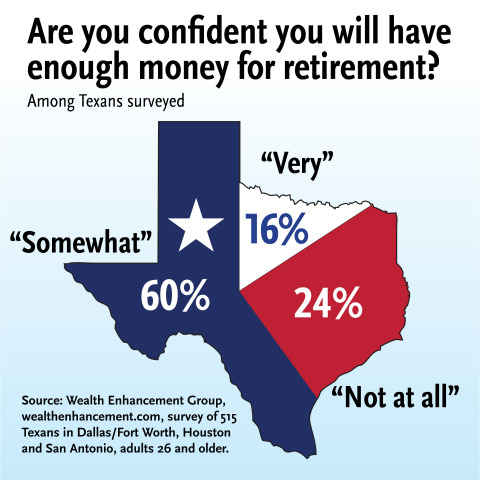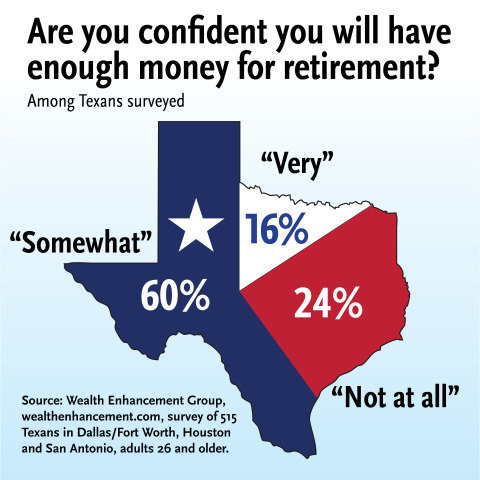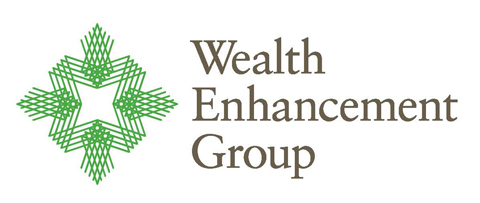MINNEAPOLIS--(BUSINESS WIRE)--Are Texans’ perceptions of personal wealth and readiness for retirement holding or folding? Residents from Texas’ three largest cities believe they have accrued more wealth than their parents did when they were their age. However, many are not confident they will have enough money for retirement and plan to work until they are no longer able, according to a new survey by Wealth Enhancement Group, which now offers Accession, a wealth management service for affluent individuals and families in Texas.
The study surveyed 515 residents, ages 26-75, from Dallas-Fort Worth, Houston and San Antonio on their perceived financial security*. Of respondents still working, nearly half said they plan on working until they are no longer able. About 16 percent of the participants surveyed, meanwhile, said they were “very” confident they will have enough money for retirement. Recent findings conclude that while Texans are more confident about their retirement than the national average (13 percent**), they are still concerned about their financial security.
“I think what this survey captures is that generations currently in their wealth-building years are facing a new reality: retirement is no longer guaranteed,” says Bruce Helmer, co-founder of Wealth Enhancement Group, a financial advisor and author of the book Real Wealth. “For many years now, members of the baby boomer generation and Generation X learned that they may not receive Social Security benefits. Combine that with the greatest recession since the Great Depression, credit card debt and employers having to tighten on benefits, no wonder so many Texans feel uncertain about their retirement.”
And if survey participants inherited $10,000, would they pay down debt or invest it toward their retirement? Among the four choices provided, nearly half said they would invest it (49 percent), before paying it toward their debt (43 percent), splurging on an extravagant purchase (6 percent) or donating it (2 percent). Of those surveyed, Dallas respondents said they were more likely to splurge on an extravagant purchase (8 percent) than those in Houston (6 percent) or San Antonio (5 percent).
Helmer says, “Of those surveyed, a combined 92 percent said they would either invest or pay down debt with an inheritance of $10,000. This finding points to Texans’ financial prowess. Although retirement confidence is not where we want it to be, with those statistics, it’s not surprising that retirement confidence is higher in Texas than the national average.”
Home Ownership
More than one-in-three Texans (34 percent) no longer believe the American dream is defined as owning a home. Indicating a generational gap, the majority of Texans surveyed over the age of 55 still believe home ownership is the American dream (55 percent of 55- to 75-year-olds).
Leaving a Financial Legacy
Survey respondents were asked if they had only one month to live, where would they want to leave their money. Among the four choices provided, participants were least likely to leave their money to an institution (1 percent), such as a medical center or university. Their priorities instead were friends or family (89 percent), followed by charities (7 percent) and faith-based organizations (3 percent). Residents in Dallas were the least likely to choose a faith-based organization (2 percent) than those residing in San Antonio or Houston (4 percent each).
“It seems as though what we are seeing is a reprioritization of wealth. Baby boomers are coming to terms with the fact that younger generations are concerned about their lives after their working years. It’s important to individuals to leave a majority of their estate to their loved ones to help alleviate that concern,” says Helmer.
Battle of the Sexes in Texas
Participants in the survey were also given five choices to describe how they measure their financial wealth. Of those surveyed, women were more likely to measure wealth by their bank account balance (83 percent) than compared to men (77 percent). More men surveyed said they measure their wealth by comparing themselves to their peers/friends/neighbors (12 percent) than compared to women (5 percent). And, among those surveyed, women were more likely to utilize a financial advisor (30 percent) than men (26 percent).
Men are more confident they will have enough money for retirement than women, with only 16 percent of men and 30 percent of women surveyed saying they were “not at all” confident they will have enough money for retirement. More than half (57 percent) of women say they will have to work until they are no longer able, versus 42 percent of men surveyed.
Money & Career
If given the choice between money and a job they love, more than three-fourths chose a job they love (77 percent) over more money and a job they dislike (23 percent). However, Houstonians have a higher propensity to say they would choose a job they dislike and more money (27 percent) than respondents in Dallas (23 percent) and San Antonio (19 percent).
When it came to job benefits, the majority surveyed would choose more money (42 percent) as a job benefit over the option to work from home (33 percent) and more time off (26 percent). Respondents from Houston opted for more money as a first choice (47 percent) compared to Dallas and San Antonio (both 39 percent).
Five Tips to Improve Your Financial Footing
Based on the results of the Texas survey, Helmer offers five suggestions to help Texans improve their financial footing.
1) Get rid of credit cards. Americans, overall, have been better at paying off their credit cards—consumer debt has been coming down. But if you have what Helmer describes as inefficient debt, a credit card with a high interest, nondeductible interest rate, paying down this debt will receive a better return than any investment.
2) Save/invest more. Helmer agrees with the common advice, “Pay yourself first.” Commit to yourself by saving money, maxing out your 401(k) contributions and making other smart choices that will help solidify your financial stability.
3) Be tax smart. Evaluate your investments to ensure you’ve got a mix of tax-deferred, tax-advantaged and taxable investments. This can help to minimize your tax burden in retirement.
4) Enhance your financial knowledge. Seek the advice of a professional advisor. Get recommendations from a friend or a co-worker and interview the advisor. Helmer says one of the advantages of working with an advisor is that it eliminates the fear that you are not doing enough to prepare for retirement. He also advocates that financially educated clients make for the best type of clients.
5) Financial planning should always begin with your core values. Helmer says when your plan aligns with your values, you will make better choices about your money—for you, and for the ones you love. It’s less likely you will be motivated by fear or greed. For example, when the market is volatile, you are more likely to stick to your financial plan because you’ve already made important financial decisions based on your values.
For more recommendations on how to pursue a financially successful retirement, download Wealth Enhancement Group’s free guide, 11 Retirement Realities You Need to Know.
*The survey, conducted by Leede Research on May 22, 2013.
** 2013
Retirement Confidence Survey, Employee Benefit Research Institute and
Mathew Greenwald & Associates.
About Wealth Enhancement Group
Wealth Enhancement Group is one of the most respected financial consulting firms. Headquartered in Minnesota’s Twin Cities, it now offers Accession, the firm’s wealth management services for affluent individuals and families in Chicago, Milwaukee and, now, Texas. Since the mid-1990s, thousands of clients have entrusted Wealth Enhancement Group with more than $3 billion in assets because of its team approach to financial planning, its independence, and its commitment to long-term relationships. Visit wealthenhancement.com for more information. The financial advisors at Wealth Enhancement Group are registered with and securities are offered through LPL financial. Member FINRA/SIPC.
About Bruce Helmer
Bruce Helmer is one of the co-founders of Wealth Enhancement Group. A frequent lecturer on personal finance topics, Bruce authored two books, “Real Wealth: How to Make Smart Money Choices for What Matters Most to YOU” and “Money and the People You Love.” Bruce also hosts the “Your Money” radio show that airs on WCCO-AM (CBS) in Minneapolis and 11 other radio stations across the upper Midwest.




